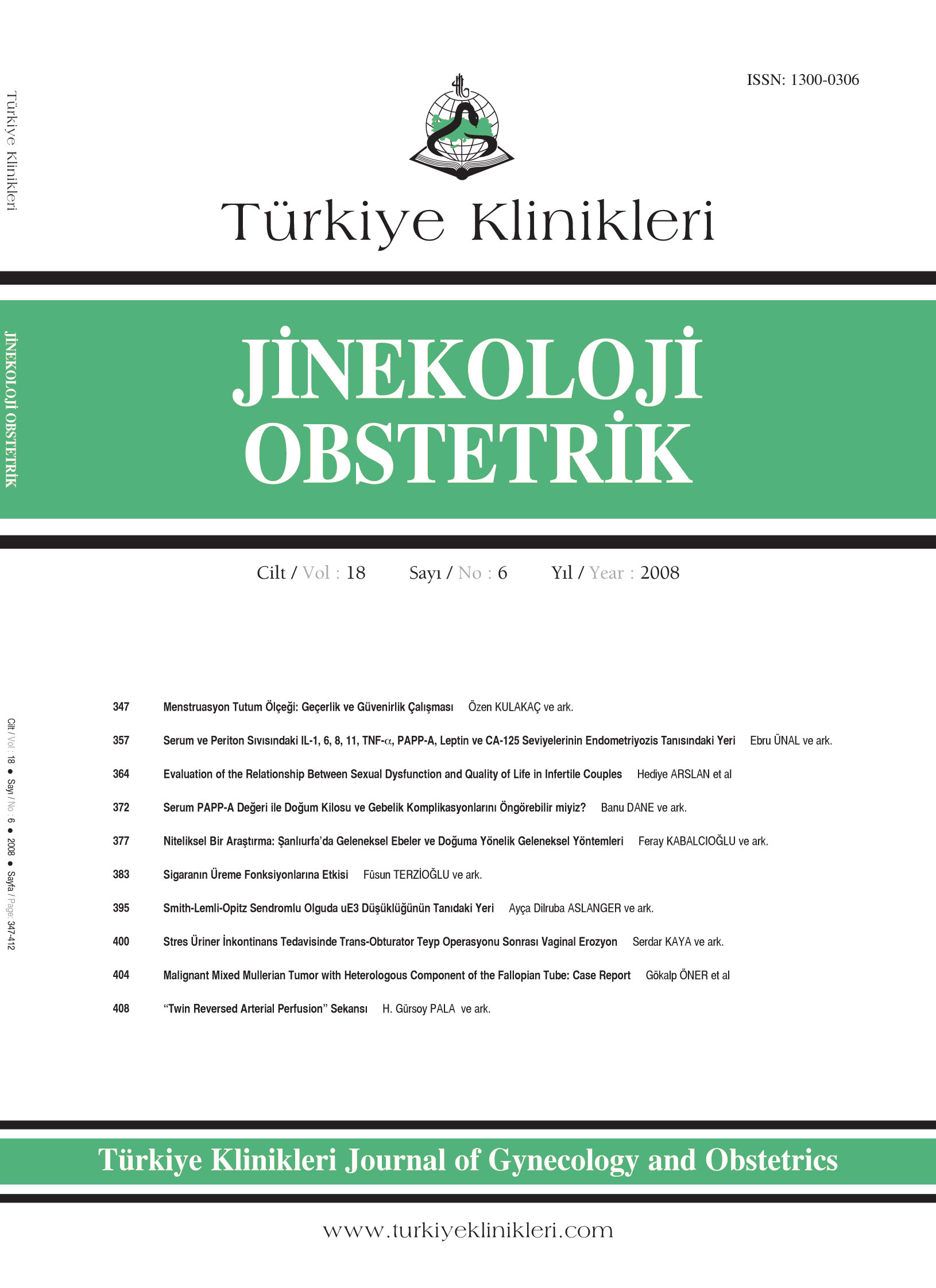Open Access
Peer Reviewed
ORIGINAL RESEARCH
2425 Viewed1296 Downloaded
Evaluation of the Relationship Between Sexual Dysfunction and Quality of Life in Infertile Couples
İnfertil Çiftlerin Cinsel Disfonksiyon Yaşama Durumları ve Yaşam Kalitelerinin Değerlendirilmesi
Turkiye Klinikleri J Gynecol Obst. 2008;18(6):364-71
Article Language: EN
Copyright Ⓒ 2025 by Türkiye Klinikleri. This is an open access article under the CC BY-NC-ND license (http://creativecommons.org/licenses/by-nc-nd/4.0/)
ABSTRACT
Objective: To determine the effect of sexual dysfunction, infertility and quality of life in infertile couples. Material and Methods: This study, designed as a descriptive and analytical study, was conducted at the in an in vitro fertilization unit of a University Hospital. Study groups consisted of 38 couples who were diagnosed as infertile and received assisted reproduction treatment. Necessary permisions were granted by the university ethics commity. An individual-specific questionnaire, Index of Female Sexual Function (ISFS) and International Index of Erectile Function (IIEF) questionnaires and for the purpose of determining quality of life, WHOQOL-BREF-Tr scale, which was adapted to Turkey by the WHO were used. Results: Decreases in both sexual activity and quality of life were more evident in women than in men. In this study, the average IFSF score for women was 29.47 ± 8.89, while the men had an IIEF score of 61.32 ± 14.80. When infertile couples were evaluated based on WHOQOL-BREF-Tr sub-scales and sub-dimensions, there were no statistically meaningful differences between the partners in terms of physical health points. Pychological and social comfort in woman may positively affect their sexual functioning. It is obvious that female sexuality is affected by environmental factors. Pychological health points in men was found statistically significantly higher and meaningful then in women (p< 0.01). Conclusion: Our findings show that psycholog'cal and social problems affect womens sexual functions. In summary, women's sexuality is more affected by the environmental factors. In the light of these findings, in comparison to men, there is more decrease in sexual function and life quality infertile women.
Objective: To determine the effect of sexual dysfunction, infertility and quality of life in infertile couples. Material and Methods: This study, designed as a descriptive and analytical study, was conducted at the in an in vitro fertilization unit of a University Hospital. Study groups consisted of 38 couples who were diagnosed as infertile and received assisted reproduction treatment. Necessary permisions were granted by the university ethics commity. An individual-specific questionnaire, Index of Female Sexual Function (ISFS) and International Index of Erectile Function (IIEF) questionnaires and for the purpose of determining quality of life, WHOQOL-BREF-Tr scale, which was adapted to Turkey by the WHO were used. Results: Decreases in both sexual activity and quality of life were more evident in women than in men. In this study, the average IFSF score for women was 29.47 ± 8.89, while the men had an IIEF score of 61.32 ± 14.80. When infertile couples were evaluated based on WHOQOL-BREF-Tr sub-scales and sub-dimensions, there were no statistically meaningful differences between the partners in terms of physical health points. Pychological and social comfort in woman may positively affect their sexual functioning. It is obvious that female sexuality is affected by environmental factors. Pychological health points in men was found statistically significantly higher and meaningful then in women (p< 0.01). Conclusion: Our findings show that psycholog'cal and social problems affect womens sexual functions. In summary, women's sexuality is more affected by the environmental factors. In the light of these findings, in comparison to men, there is more decrease in sexual function and life quality infertile women.
ÖZET
Amaç: İnfertilite sorunu yaşayan çiftlerde infertilite, cinsel disfonksiyon ve yaşam kalitesi ilişkisini belirlemek amacıyla planlanmıştır. Gereç ve Yöntemler: Çalışma İstanbul'da bir üniversite hastanesinin IVF ünitesinde yapılmıştır. İnfertilite tanısı konulan ve yardımcı üreme tekniğinden yararlanan 38 çift çalışma grubuna alınmıştır. Gerekli izinler üniversite etik kurulu tarafından verilmiştir. Çalışmada bireylere özgü anket formu, Kısa Seksüel Fonksiyon İndeks Envanteri (IFSF), Ereksiyon İşlevi Uluslararası Değerlendirme Formu (IIEF) ve yaşam kalitesini değerlendirmek amacıyla Dünya Sağlık Örgütü formunun Türkiye uyarlaması WHOQOL-Bref-Tr ölçeği kullanılmıştır. Bulgular: Kadınların cinsel aktivite ve yaşam kaliteleri erkeklere oranla daha düşüktür. Çalışmamızda infertil kadınların ortalama IFSF puanı 29.47 ± 8.89 iken, erkeklerin ortalama IIEF puanı 61.32 ± 14.80 olarak bulunmuştur. İnfertil çiftler WHOQOL -BREF-TR ölçeği alt boyutlarına göre değerlendirildiğinde ise; eşler arasında bedensel alan puanları arasında istatistiksel olarak anlamlı farklılık görülmemektedir (p> 0.05). Erkeklerin ruhsal alan puanları kadınlara göre anlamlı düzeyde yüksek bulunmuştur (p< 0.01). Bizim bulgularımıza göre, ruhsal ve sosyal problemler kadınların cinsel fonksiyonlarını oldukça etkilemektedir. Sonuç: Özetle, kadın cinselliği çevresel faktörlerden daha fazla etkilenmektedir. Bu sonuçlar doğrultusunda, infertilite sorunu yaşayan çiftlerde cinsel fonksiyon ve yaşam kalitesinde erkeklere oranla infertil kadınlarda daha belirgin azalmalar olduğu söylenebilir. Anahtar Kelimeler:
Amaç: İnfertilite sorunu yaşayan çiftlerde infertilite, cinsel disfonksiyon ve yaşam kalitesi ilişkisini belirlemek amacıyla planlanmıştır. Gereç ve Yöntemler: Çalışma İstanbul'da bir üniversite hastanesinin IVF ünitesinde yapılmıştır. İnfertilite tanısı konulan ve yardımcı üreme tekniğinden yararlanan 38 çift çalışma grubuna alınmıştır. Gerekli izinler üniversite etik kurulu tarafından verilmiştir. Çalışmada bireylere özgü anket formu, Kısa Seksüel Fonksiyon İndeks Envanteri (IFSF), Ereksiyon İşlevi Uluslararası Değerlendirme Formu (IIEF) ve yaşam kalitesini değerlendirmek amacıyla Dünya Sağlık Örgütü formunun Türkiye uyarlaması WHOQOL-Bref-Tr ölçeği kullanılmıştır. Bulgular: Kadınların cinsel aktivite ve yaşam kaliteleri erkeklere oranla daha düşüktür. Çalışmamızda infertil kadınların ortalama IFSF puanı 29.47 ± 8.89 iken, erkeklerin ortalama IIEF puanı 61.32 ± 14.80 olarak bulunmuştur. İnfertil çiftler WHOQOL -BREF-TR ölçeği alt boyutlarına göre değerlendirildiğinde ise; eşler arasında bedensel alan puanları arasında istatistiksel olarak anlamlı farklılık görülmemektedir (p> 0.05). Erkeklerin ruhsal alan puanları kadınlara göre anlamlı düzeyde yüksek bulunmuştur (p< 0.01). Bizim bulgularımıza göre, ruhsal ve sosyal problemler kadınların cinsel fonksiyonlarını oldukça etkilemektedir. Sonuç: Özetle, kadın cinselliği çevresel faktörlerden daha fazla etkilenmektedir. Bu sonuçlar doğrultusunda, infertilite sorunu yaşayan çiftlerde cinsel fonksiyon ve yaşam kalitesinde erkeklere oranla infertil kadınlarda daha belirgin azalmalar olduğu söylenebilir. Anahtar Kelimeler:
MENU
POPULAR ARTICLES
MOST DOWNLOADED ARTICLES





This journal is licensed under a Creative Commons Attribution-NonCommercial-NoDerivatives 4.0 International License.










